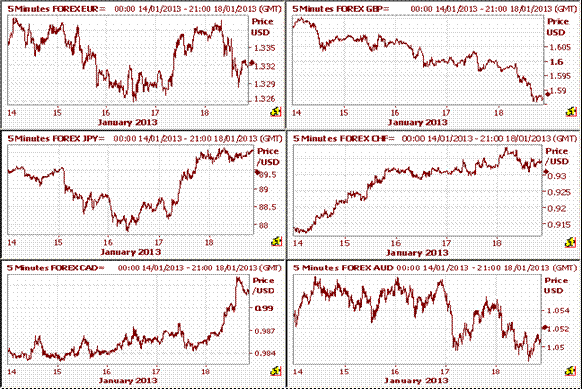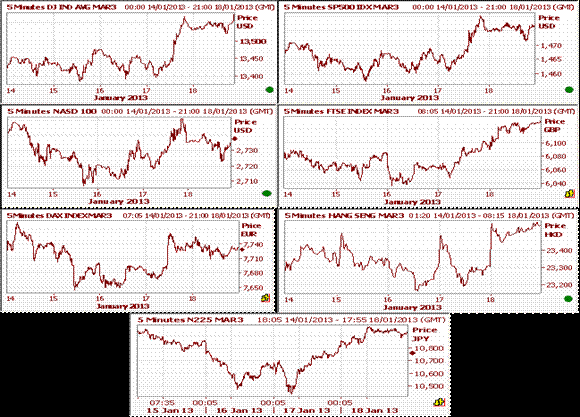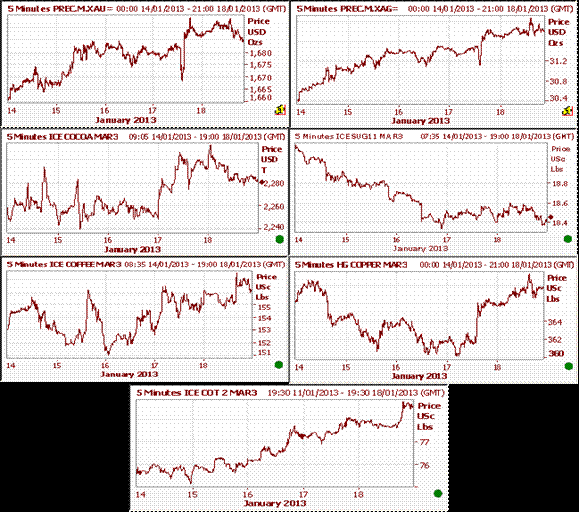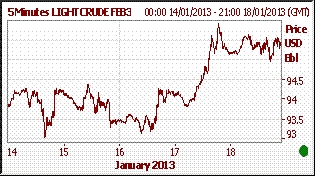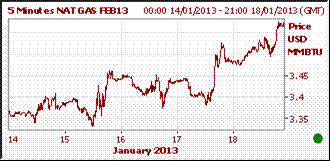FOREX
Forex – The yen dropped to a 31-month low against the US dollar on Friday, sliding for a 10th straight week, on expectations of aggressive monetary policy action from the Bank of Japan. Investors, however, opted to book profits in the euro versus the yen, although the currency was 0.6 percent higher last week and 4.8 percent stronger so far in 2013. The euro also fell against the dollar after steep gains the previous session. The dollar has gained 3.8 percent against the yen this year and most strategists believe the US currency is poised to continue appreciating if the BoJ early next week takes steps, beyond market expectations, to halt a deflationary spiral. Sources familiar with the BoJ's thinking have said the central bank will consider making an open-ended commitment to buy assets until the 2 percent inflation target is reached. Such a plan would exceed market expectations, analysts said.
The safe-haven dollar could further gain against riskier currencies such as the Aussie dollar over the next month, as US politicians debate how to raise the country's borrowing limit, or debt ceiling. Worries about the debt ceiling weighed on a US consumer confidence index for January, which on Friday showed a decline for a second straight month, to its lowest level in more than a year. The Thomson Reuters/University of Michigan's preliminary reading on the overall index on consumer sentiment came in at 71.3, down from 72.9 the month before. The index was at its lowest since December 2011. It was also below the median forecast of 75 among economists.
Riskier assets got a reprieve in the afternoon. US House Republican leaders said they would seek to pass a three-month extension of federal borrowing authority next week to give the Senate time to pass a budget plan that reduces the country's fiscal deficit. The plan, hatched at a House Republican retreat, marks a new strategy from the party to break a budget deadlock by forcing the Senate to act first. The Treasury needs congressional authorisation to raise the current $16.4 trillion limit on US debt sometime between mid-February and early March. The Senate has not passed a formal budget resolution in nearly four years, while the House has passed budgets that have died in the Senate. Under the planned legislation, if the Senate or the House fail to pass a budget by April 15, lawmakers' pay would be withheld.
INDICES
Indices – World equity and oil prices rebounded on Friday after Republican leaders of the US House of Representatives said they would seek to break a budget impasse next week, while the yen hit a 31-month low against the US dollar ahead of potential asset purchases by the Bank of Japan. For the week, the Dow gained 1.2 percent, the S&P 0.9 percent and the Nasdaq 0.3 percent.
On Wall Street, the Dow and the S&P 500 posted five-year closing highs after Republicans said the House will consider a bill to raise the US debt ceiling enough to allow the country to pay its bills for another three months. The strategy would buy time for the Democratic-controlled Senate to pass a budget plan that shrinks the federal deficit. The Nasdaq finished slightly lower, pulled down by a weak earnings outlook by Intel Corp, the world's leading chip maker. Shares of Intel slumped 6.3 percent to $21.25 a day after the company forecast quarterly revenue below analysts' estimates and announced plans for increased capital spending amid slow demand for personal computers. Earlier, stocks had faltered after a survey that showed US consumer sentiment fell to its lowest level this month since December 2011.
China reported that its economy grew at a slightly faster-than-expected 7.9 percent in the fourth quarter of 2012, a clear sign it has avoided a sharp economic slowdown, though the annual growth rate was the weakest in 13 years. Evidence of a burgeoning recovery in exports, stronger than expected industrial output and retail sales, together with robust fixed asset investment, all indicated that Beijing's pro-growth policy mix has gained sufficient traction to underpin a revival without yet igniting inflationary risks. China's new leaders must stabilise the economy this year to keep employment high while avoiding a surge in housing prices and inflation that could undermine reforms needed to overhaul the country's export-oriented growth model. The China data followed strong US labour and housing market reports on Thursday, providing fresh impetus to a broad rally in equities, precious metals and commodities since the start of the year.
COMMODITIES
Commodities mainly recovered from an early dip to finish the week up after news that the US House of Representatives will consider a bill to raise the debt ceiling enough to allow the country to pay its bills for another three months. But gains were capped by a surprise drop in US consumer sentiment to the lowest level in more than a year, with many consumers citing fallout from the ongoing fiscal wrangling in Washington. Copper ended up for both the day and week, bolstered by better-than-expected fourth quarter growth in top consumer China's economy.
Gold prices were slightly lower on Friday as weak US consumer sentiment data offset earlier strength following positive economic data from China, the world's second-biggest economy. Gold pushed to a high of $1,694.90 in early trade, close to the previous session's one-month peak, but retreated ahead of the long US holiday weekend after US data showed consumer sentiment at its lowest in more than a year. The metal had been lifted by renewed physical demand in China ahead of the New Year in February and after better-than-forecast Chinese GDP data. In the longer term, expectations that the US Federal Reserve would continue its monetary stimulus and concerns about US fiscal conditions will keep gold attractive as a hedge against inflation and uncertainty, market participants said.
ENERGY
Crude Oil – Oil prices rose on Friday, recovering from an earlier dip after news that the US House of Representatives will consider a bill to raise the debt ceiling enough to allow the country to pay its bills for another three months. Gains were capped by a surprise drop in US consumer sentiment to the lowest level in more than a year, with many consumers citing fallout from the ongoing fiscal wrangling in Washington.
World oil markets are tightening as Chinese fuel demand increases and OPEC supplies fall, draining inventories, the West's energy agency said on Friday, in a trend that could put extra upward pressure on prices. The International Energy Agency, which advises the industrialised nations on energy policies, has in the past few months described the oil markets as very well supplied. It said it had now a more "sobering, 'morning after' view" although it was too early to become seriously concerned or declare a return to the bull market. It steeply raised 2013 global oil demand forecasts despite concerns about the health of the world economy. The IEA raised its call on OPEC crude and stocks for 2013 by 100,000 bpd, to 30 million bpd, still below the current production. It also said China's recent economic indicators have signalled the potential for a rebound in oil consumption after a slowdown to spectacular growth in 2012. Non‐OPEC production was projected to rise by 980,000 bpd to 54.3 million bpd, the highest growth rate since 2010. It said that beyond wars and political tensions in Syria, Iran, Iraq, Libya or Venezuela, there were also risks of abrupt tax and trade policy changes in other countries.
US crude stocks fell last week as imports dropped and fuel stocks rose, according to weekly data from the US Energy Information Administration on Wednesday. Crude stocks fell by 951,000 barrels to 360.3 million barrels in the week to January 11, the EIA said. Analysts had expected stocks to rise by 2.3 million barrels. Supplies of gasoline rose by 1.91 million barrels, compared with analyst expectations for a 2.9 million barrel rise. Inventories of distillates, a category that covers diesel and home heating oil, rose by 1.69 million barrels, compared with expectations for a 1.9 million barrel rise.
Natural Gas – Gas prices ended higher on Friday, the sixth gain in the last seven sessions, backed by a bullish weekly inventory report on Thursday and fairly cold forecasts for the next 10 days that should boost heating needs. While the frigid weather outlook should support prices in the near term, many traders remain sceptical of the upside, with inventories still relatively high and production flowing at or near an all-time peak.
EIA data on Thursday showed total domestic gas inventories fell last week by 148 billion cubic feet to 3.168 trillion cubic feet. Traders viewed the decline as bullish, noting it was well above the estimate of 136 bcf and the third straight week that the inventory draw exceeded expectations. The weekly draw sharply widened the storage deficit relative to last year by 59 bcf to 147 bcf, or 4 percent. While it also trimmed 4 bcf from the surplus versus the five-year average, stocks are still high at 316 bcf, or 11 percent above average. Early withdrawal estimates for next week's storage report range from 122 bcf to 190 bcf. Stocks fell an adjusted 162 bcf during the same week last year, while the five-year average decline for that week is 176 bcf.
The information set forth herein was obtained from sources which we believe to be reliable, but its accuracy cannot be guaranteed. It is not intended to be an offer, or the solicitation of any offer, to buy or sell the products or instruments referred herein. Any person placing reliance on this commentary to undertake trading does so entirely at their own risk.
Recommended Content
Editors’ Picks
EUR/USD clings to small gains above 1.0700 ahead of data

EUR/USD trades marginally higher on the day above 1.0700 on Tuesday after EU inflation data for April came in slightly stronger than expected. Market focus shifts to mid-tier US data ahead of the Fed's policy announcements on Wednesday.
GBP/USD recovers to 1.2550 despite US Dollar strength

GBP/USD is recovering losses to trade near 1.2550 in the European session on Tuesday. The pair rebounds despite a cautious risk tone and broad US Dollar strength. Investors await macroeconomic data releases from the US.
Gold extends daily slide toward $2,310 ahead of US data

Gold stays under bearish pressure and declines toward $2,310 on Tuesday. The benchmark 10-year US Treasury bond yield holds steady at around 4.6% ahead of US data, making it difficult for XAU/USD to stage a rebound.
XRP hovers above $0.51 as Ripple motion to strike new expert materials receives SEC response

Ripple (XRP) trades broadly sideways on Tuesday after closing above $0.51 on Monday as the payment firm’s legal battle against the US Securities and Exchange Commission (SEC) persists.
Mixed earnings for Europe as battle against inflation in UK takes step forward

Corporate updates are dominating this morning after HSBC’s earnings report contained the surprise news that its CEO is stepping down after 5 years in the job. However, HSBC’s share price is rising this morning and is higher by nearly 2%.
